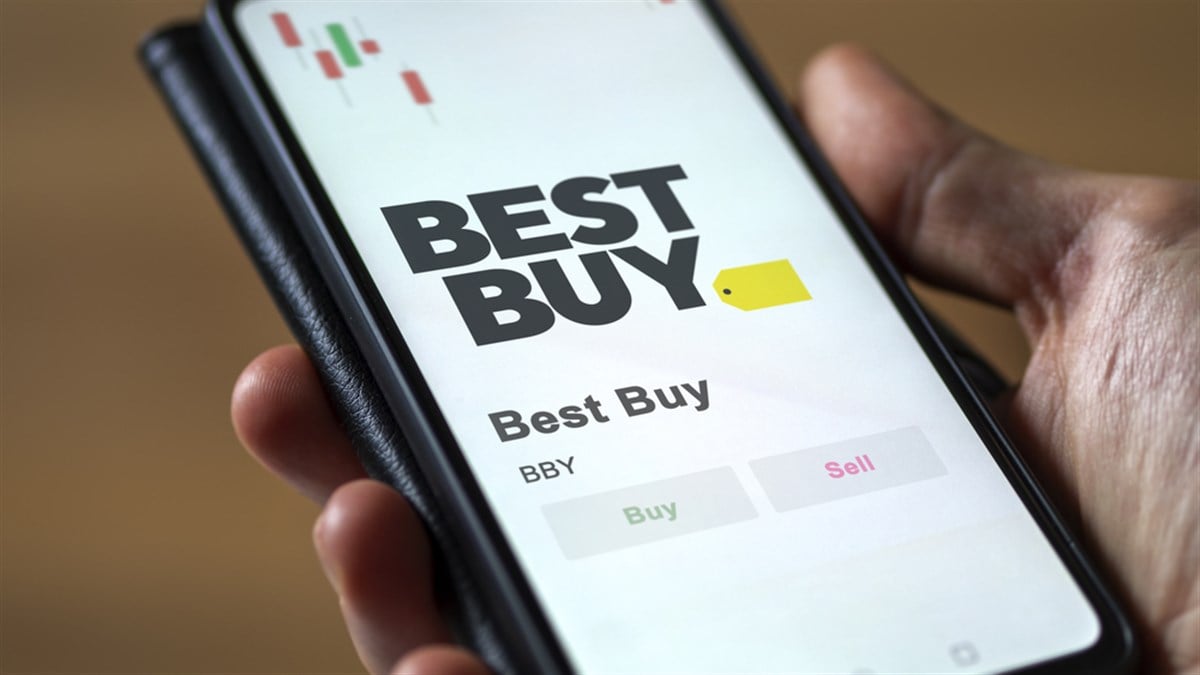
When it comes to the companies positioned to benefit from artificial intelligence (AI) breakthroughs, Best Buy Co., Inc. (NYSE: BBY) likely doesn’t come to mind. But maybe it should.
Earlier this month, sell-side research firm Jeffries upgraded the retailer from Hold to Buy. Among the reasons behind the upgrade — rising consumer interest in AI technologies.
While AI-based electronics are yet to hit Best Buy shelves, the analyst predicts that by year end the company will see a financial boost from initial AI product rollouts. Devices that can analyze data, learn from it and act on what they discover are expected to be introduced to U.S. shoppers as early as next year. This includes smarter smartphones, watches, laptops and televisions designed to enhance our daily lives. Best Buy’s resurgence as an omnichannel retailer could make it an unlikely AI winner over the next few years.
Jeffries also cited a new cyclical upswing in consumer electronics demand (after a pandemic-driven demand was followed by an inevitable downswing) as a factor in the upgrade. The firm believes Best Buy could reap additional long term benefits from a housing market rebound and a growing lineup of health-related products.
On Tuesday, Loop Capital doubled down on its bullish Best Buy sentiment, giving the stock a Street-high $90.00 price target. Following last month’s buy opinions from Goldman Sachs and D.A. Davidson, this makes it four straight buy calls for the often maligned retailer.
Wall Street’s bullish wave comes at a time when Best Buy shares are on pace to record a second consecutive down year — and trading 45% below their November 2021 record peak. While recently revised price targets imply modest upside over the next 12 months, they could foretell the start of a lasting uptrend for Best Buy investors — especially if the AI story plays out.
How is Best Buy performing this year?
Best Buy limps into the final lap of 2024 after reporting mixed third-quarter results. Revenue fell 8% year-over-year to $9.76 billion, shy of the consensus estimates. Earnings per share (EPS) were down 7% from last year but topped the Street’s forecast. Due to lingering inflation and high-interest rates, CEO Corie Barry called the consumer demand backdrop “even more uneven and difficult to predict.”
A challenging macroeconomic environment has been the tale of the tape for consumer electronics retailers in 2023. Cautious spending behaviors have Best Buy’s year-to-date sales trending 8% below last year. The good news — the all-important holiday shopping period has yet to hit the books.
According to Adobe Analytics, American households spent a record $38 billion online during the five-day stretch from Thanksgiving to Cyber Monday. Through November 27th, monthly e-commerce sales increased 7.3%. The biggest spending category? Electronics.
The strong start to the holiday shopping season shows that consumers are being drawn to discounts and flexible payment plans like BNPL. And with brick-and-mortar traffic also up from last year, Best Buy could be in for a strong finish in 2023 (fiscal 2024).
Analysts are projecting that the retailer will haul in $14.6 billion in fourth-quarter sales, roughly in-line with what it achieved in Q4 of 2022. EPS is expected to be down 3% from last year. But if Best Buy can attract bargain-minded shoppers and continue to benefit from restructuring cost reductions, a seventh straight quarterly EPS beat could be in the cards.
What is the total return potential for BBY?
Based on the average price target (~$75.00) among analysts that have refreshed their numbers since the Q3 report, Best Buy shares have little if any, upside. Worst case scenario, Citi’s sell rating and $60.00 target holds true and the stock dives more than 20%. Best case, this week’s Loop Capital $90.00 call is accurate, and BBY trends 16% higher over the next 12 months.
But let’s not forget Best Buy’s rising dividend. Over the last five years, the board has increased the dividend at a 15% annualized rate. The current quarterly payout is $0.92 per share or $3.68 annually. This equates to a 4.8% forward yield that is one of the highest among S&P 500 consumer cyclical stocks. Taking the $90 stock price scenario, this gives BBY a total return potential of around 21% over the next year.
Of course, much could change based on the retailer’s fourth-quarter performance. A surprise return to profit growth could give the stock a big boost to kickstart 2024 — and the arrival of AI electronics could set the stage for accelerating growth in 2025.

